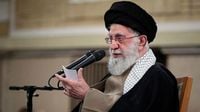In a pivotal moment for U.S.-Iran relations, Iran's Supreme Leader Ayatollah Ali Khamenei expressed cautious optimism regarding the ongoing talks between the two nations, even as he underscored the necessity of maintaining a realistic perspective on the negotiations. Speaking to high-ranking officials in Tehran on April 15, 2025, Khamenei acknowledged the progress made in the initial round of discussions but warned against excessive optimism or pessimism. "We shouldn’t be overly optimistic about this dialogue, nor overly pessimistic," the 85-year-old leader stated, emphasizing that both sides have clear red lines. He added, "We may or may not reach a result, but either way, it’s worth pursuing." Khamenei's remarks come as the second round of talks is set to take place on April 19, 2025, in Oman, a location that has recently been confirmed after initial suggestions of Rome as the venue.
U.S. Special Envoy Steve Witkoff, who is leading the American delegation, outlined that the upcoming discussions will focus primarily on the verification of Iran's uranium enrichment and weapons development programs. Witkoff noted, "The conversation with the Iranians will be much about two critical points. One enrichment, as you mentioned. They do not need to enrich past 3.67%. In some circumstances, they're at 60% and other circumstances 20%." He stressed that stringent verification processes are essential, reflecting President Trump's stance that without positive outcomes from these talks, alternative measures may need to be considered. Witkoff stated, "We're going to have to have very tight verification; there hasn't been much in the way of verification in the last several years prior to our administration. That's got to change. And if it changes, then we'll have the basis for positive talks. And if it doesn't change, then we'll have to seek alternatives which will not be good for anybody."
The backdrop to these discussions is fraught with tension, as President Trump has consistently threatened airstrikes on Iran's nuclear facilities should an agreement fail to materialize. The stakes are high, especially as Iranian officials have increasingly signaled a potential pursuit of nuclear weapons, citing their growing stockpile of uranium enriched to near weapons-grade levels. The U.S. and Iran have been entangled in nearly fifty years of hostility, making the current negotiations all the more significant.
In a related diplomatic effort, President Trump spoke on the same day with Sultan Haitham bin Tariq al-Said of Oman regarding the upcoming talks. The White House reported that Trump reiterated his commitment to preventing Iran from acquiring nuclear weapons, a directive he has emphasized throughout his administration. White House press secretary Karoline Leavitt stated, "The maximum pressure campaign on Iran continues. The president has made it clear he wants to see dialogue and discussion with Iran, while making his directive about Iran never being able to obtain a nuclear weapon quite clear."
During the call, Trump and the Sultan also discussed ongoing U.S. operations against Yemen's Houthis, further highlighting the complex geopolitical landscape in which these negotiations are taking place. Since reinstating a maximum pressure campaign against Iran in February 2025, following his withdrawal from the 2015 nuclear agreement, Trump has reimposed stringent sanctions on the Islamic Republic. This has led to a rapid advancement of Iran's nuclear program, complicating the already delicate negotiation process.
The initial round of talks held on April 12, 2025, in Oman was described as positive by both sides, though progress remains to be seen as the second round approaches. The U.S. and Iran have engaged in indirect talks during the previous administration, but little progress was made, leaving many observers skeptical about the potential for a breakthrough this time around.
As the clock ticks down to the next round of negotiations, the international community watches closely. The outcome of these talks could have significant implications not only for U.S.-Iran relations but also for regional stability in the Middle East. The contrasting approaches of both nations—Khamenei's cautious optimism paired with Trump's aggressive stance—create a complex dynamic that will be tested in the coming days.
With Khamenei urging officials not to tie the country’s affairs too closely to the negotiations, he remains acutely aware of the historical context of U.S.-Iran relations. "Of course, we don’t fully trust them - we know who we’re dealing with," Khamenei remarked, reflecting a deep-seated skepticism that continues to shape Iran's diplomatic posture. As the talks unfold, the balance between diplomatic engagement and national security concerns will be at the forefront of discussions.
In conclusion, the upcoming U.S.-Iran talks represent a critical juncture in a long-standing and fraught relationship. With both Khamenei and Trump articulating their respective positions, the world waits to see if these discussions will yield a path forward or deepen the existing divide.




